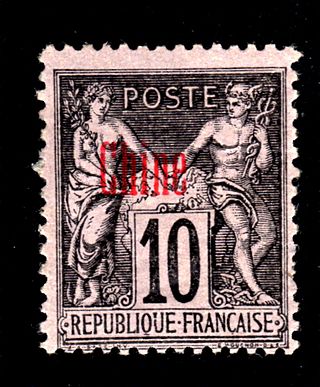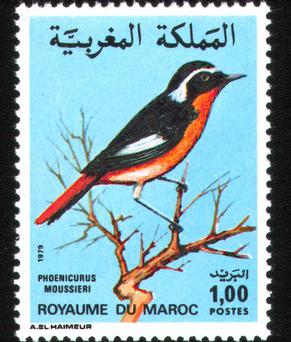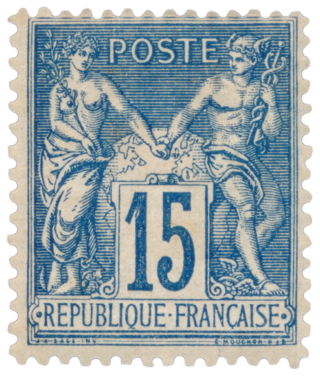
The French post offices in China were among the post offices maintained by foreign powers in China from the mid-19th century until 1922. The first French Post Office in China opened in 1862. Initially, the French government used ordinary French postage stamps for these offices. These forerunner stamps can be shown to have been sold or used in China only by a postmark. Stamps used at Shanghai prior to 1876, for example, can only be identified by diamond-shaped cancel made of a type referred to as a “losange à gros chiffres” with the numbers "5104" in the center of the cancel.
This is a survey of the postage stamps and postal history of Afghanistan.

This a survey of the postage stamps and postal history of the Russian Empire, the Soviet Union and the modern Russian Federation.

Hongkong Post is a government department of Hong Kong responsible for postal services, though operated as a trading fund. Founded in 1841, it was known as Postal Department or Post Office before the handover of Hong Kong in 1997. It has been a sub-member of the Universal Postal Union since 1877, and is a separate entity from China Post.

The Russian post offices abroad were established by Russia between the late 18th and early 20th centuries to handle mail service where the local service was deemed unreliable. The first such were the Russian post offices in the Ottoman (Turkish) Empire, which began operations in the 1770s. All the post offices closed during the 1910s.
Each "article" in this category is a collection of entries about several stamp issuers, presented in alphabetical order. The entries are formulated on the micro model and so provide summary information about all known issuers.
Each "article" in this category is a collection of entries about several stamp issuers, presented in alphabetical order. The entries are formulated on the micro model and so provide summary information about all known issuers.

The British post offices in Morocco, also known as the "Morocco Agencies", were a system of post offices operated by Gibraltar and later the United Kingdom in Morocco.

The postal history of Morocco is complex due to the country's political development in the 20th century. Mail was sent via post offices operated by the Sherifian post created by the Sultan, and by the European powers. After Morocco was partitioned into protectorates of France and of Spain in 1912, both European administrations established postal services in their respective zones.

Chunghwa Post Co., Ltd. is the official postal service of Taiwan. Chunghwa Post was a government agency of the Ministry of Transportation and Communications until 2003, when it was reorganized into a government-owned corporation.

The German post offices abroad were an extraterritorial network of German post offices in foreign countries with a significant German commercial interest to provide mail service where the local services were generally deemed unsafe or unreliable, such as China, Morocco, Ottoman Empire and Zanzibar. The system ended during or shortly after World War I.
The German Post Offices Abroad were a network of post offices in foreign countries established by Germany to provide mail service where the local services were deemed unsafe or unreliable. They were generally set up in cities with some sort of German commercial interest. In the earliest period when such offices were open, stamps used there can only be identified by their cancellations. Such stamps are known as "Vorläufer" (forerunner) stamps. Later stamps issued for use at a post office abroad can generally be identified by overprints even when not postally used. Germany began issuing distinctive stamps for use overseas beginning in the late 19th century, and the number and variety of issues reached its heyday at the beginning of the 20th century. All German Post Offices Abroad were closed down during or shortly after World War I.
The German post offices abroad were a network of post offices in foreign countries established by Germany to provide mail service where the local services were deemed unsafe or unreliable. They were generally set up in cities with some sort of German commercial interest. In early use only the cancellation mark can identify their postal use abroad; such stamps are known as "Vorläufer" (forerunner) stamps. Later stamps are identified by overprints even when not postally used. German abroad stamps started appearing in the late 19th century and reached their heyday at the beginning of the 20th century; they closed down during or shortly after World War I.

The German post offices abroad were a network of post offices in foreign countries established by Germany to provide mail service where the local services were deemed unsafe or unreliable. They were generally set up in cities with some sort of German commercial interest. In early use only the cancellation mark can identify their postal use abroad; such stamps are known as "Vorläufer" (forerunner) stamps. Later stamps are identified by overprints even when not postally used. German abroad stamps started appearing in the late 19th century and reached their heyday at the beginning of the 20th century; they closed down during or shortly after World War I.

Posta Shqiptare is the national postal service of Albania. Posta Shqiptare sh.a. is a public limited company owned by the Albanian Government. As of 2017 its CEO was Laert Duraj.

This is a survey of the postage stamps and postal history of Iran.

This is a survey of the postage stamps and postal history of Zanzibar.

The Republic of South Sudan became independent on 9 July 2011 from Sudan and issued its first stamps on 13 July 2011. Only almost three months later, on 4 October 2011, did South Sudan become a member of the Universal Postal Union (UPU). Before independence, South Sudan used stamps issued by Sudan. The Directorate of Postal Services of the Ministry of Telecommunication and Postal Services is responsible for postal affairs in South Sudan.

"Type Sage" is a reference to the definitive series of postage stamps issued by the post office of France between 1876 and 1900. Printed in a variety of colors and shades, the two central figures are allegories of Peace (left) and Commerce (right), giving rise to the name of the series. The name "Type Sage" comes from the tendency of French stamp collectors to refer to the series by the name of the designer of the artwork, in this case Jules Auguste Sage, whose name appears as "J. A. SAGE INV" along the lower left edge of the stamp beneath the word "REPUBLIQUE" of "REPUBLIQUE FRANCAISE."
This page is based on this
Wikipedia article Text is available under the
CC BY-SA 4.0 license; additional terms may apply.
Images, videos and audio are available under their respective licenses.














